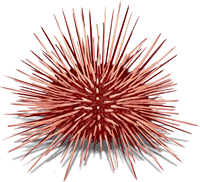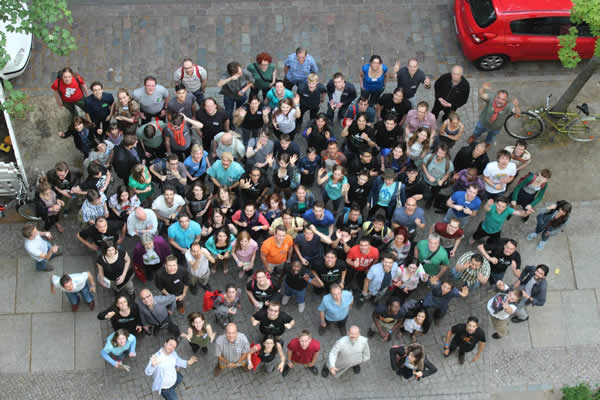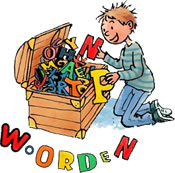Bloavezh mat / 新年快樂 / Blydhen Nowydh Da / Šťastný nový rok / Gelukkig Nieuwjaar / Happy New Year / Bonne année / Einen guten Rutsch ins neue Jahr / Athbhliain faoi mhaise daoibh / Felice anno nuovo / 新年おめでとうございます / Blein Vie Noa / Feliz Ano Novo / С Новым Годом / Bliadhna mhath ùr / Срећна Нова Година / ¡Feliz Año Nuevo! / Gott nytt år / Blwyddyn newydd dda, and so on!
Category: Dutch (Nederlands)
Hedgehogs and Urchins

I discovered today that sea urchins (echinoidea) are known as zee-egels (sea hedgehogs) in Dutch, and that they used to be known as sea hedgehogs in English as well. They have similar names in other languages, for example, in German they are Seeigel (sea hedgehogs), in French they are oursins or hérissons de mer (sea hedgehogs) and in Spanish they are erizos de mar (sea hedgehogs).
The word urchin comes from the Middle English word yrichon (hedgehog), from the Old North French word *irechon, from the Old French herichun (hedgehog) – in Modern French hedgehog is hérisson – from the Vulgar Latin *hericionem, from the Latin ericius (hedgehog), from the Proto-Indo-European root *ghers- (to stiffen, bristle, stand out). From the same root we also get such English words as gorse, hirsute, horror and ordure.
The word urchin is apparently still used for hedgehog in some English dialects such as Cumbria, Yorkshire and Shropshire. It came to refer to people who looked or acted like hedgehogs from the early 16th century, and to poor, ragged youths from the mid 16th century, though this usage didn’t really take off until the late 18th century. Sea urchin was first used in the late 16th century.
Sources: Online Etymology Dictionary and Indo-European Lexicon
Reverse psychology and language learning
Yesterday I met Aran Jones, the guy behind the website SaySomethingin.com, and we had a very interesting chat, in Welsh, about language learning. His site started as a Welsh language course, and now also offers courses in Cornish, Dutch, Latin and Spanish. You can learn all these languages through English or Welsh, and you can also learn English and Welsh through Spanish, and he plans to offer more languages in the future. The courses are designed to get you speaking in a relatively short time.
One interesting point we discussed was the way language learning is presented. Many courses claim that you can learn a language quickly and with little or no effort. All you have to do is listen and repeat – don’t worry about learning grammar or vocabulary! Moreover people who encourage others to learn languages tend to emphasize that it is possible, anybody can do it, that you don’t have to have a special language gene/gift/talent, and that it isn’t all that difficult. Just jump in and start speaking! Don’t worry about mistakes!
An alternative approach is to say that language learning is really hard, takes a lot of work, and that relatively few people succeed, and to discourage people from trying it. By presenting it as a real challenge like this you might encourage more people to try. When they find it isn’t as difficult as they expected and that they can succeed, they will have a greater sense of achievement. In other words, a kind of reverse psychology. On the other hand, many people already believe this and are convinced that they can’t learn a language, so it wouldn’t work for everyone.
Another thing we discussed was improving your listening comprehension, especially if you find speech at normal speed difficult to understand. Slowing down your recordings, or asking people to speak more slowly, is a way to deal with this, and can work well. An alternative is to speed up the audio – in some SaySomethingin lessons the audio is at twice the usual speed, for example, and if you listen to it quite a few times you will eventually understand it. Then when you listen to it at normal speed it will be much easier to follow.
Here’s an example of recording in Spanish at normal speed (which sounds fast to me).
Here’s this recording at twice the normal speed.
I do something similar when learning to play classical pieces on the guitar and piano – if I’m struggling with a piece I might try something even more challenging. Then the original piece seems easier when I go back to it. Or I try playing folk tunes as fast as I can, then slow then down to a more normal speed, and they seem much easier.
Polyglottery

Yesterday morning I met up with other conference participants and after a bit of a wander around the city, we had lunch then went to the opening ceremony a reception. In the after we had a little guided tour of Novi Sad seeing some interesting buildings, including the Catholic or Orthodox Cathedrals, and the fortress. There are some rather attractive buildings here, wide, pedestrianised café-lined streets, some nice parks and generally a relaxed kind of atmosphere.
In the evening we all went to a restaurant about 4 or 5km from the city centre for dinner. I walked there with a few others, and the rest went by bus or taxi. We had a nice dinner with lots of polyglot chat, then some people started dancing, and others carried on chatting.

Today there were lectures and talks on a variety of topics including sound symbolism, the magic of metaphors, language coaching, and acting and humour in a foreign language.
So far I’ve had conversations in about 10 languages and spoken bits and pieces of maybe 10 others. In some cases this was only a few words (all I know), in others it was a bit more. There are even two guys here who are learning Scottish Gaelic, one of whom also speaks a bit of Manx, and another who is learning Irish.
Flierefluiter
The other day I learnt an interesting word in Dutch – flierefluiter – which a Dutch friend described as being a “butterfly type of person”. That is, someone who rarely sticks to or finishes anything.
According to the vanDale dictionary flierefluiter is a nietsnut (layabout or someone fit for nothing).
According to Dictionarist a flierefluiter is a ‘loafer, idler, dawdler, lazy person; low slip-on shoe’.
Are there interesting words for this type of person in other languages?
Oideas Gael
I’m having a wonderful time in Gleann Cholm Cille learning to play the harp and speaking plenty of Irish. The course is going really well – we started with basic techniques, and have learnt a number of tunes, including some from the Bóroimhe / Brian Boru suite by Michael Rooney.
I’ve videoed our teacher, Oisín Morrison, playing all the pieces we’ve learnt so far, and he’s going to give us some more pieces to learn at home.
People come here from all over the world on holiday and to do courses at Oideas Gael – this week you can do Irish language classes, harp playing, or hill walking – so there are opportunities to speak quite a few languages, including French, German, Swedish, Mandarin, Dutch and Scottish Gaelic. I’ve even learnt a bit of Serbian from a Bosnian woman who is studying Irish here.
Extreme Polyglottery
The Polyglot Gathering in Berlin last week was fantastic and I enjoyed everything about it. The organizers did an excellent job and everything went well, with only minor hitches. Many other people helped things to run smoothly, and gave talks and/or arranged discussions and language practise sessions.

Venue
The venue was a huge hostel/hotel near Berlin’s Hauptbahnhof (main station), and not far from famous places like the Reichstag (home of the German parliament) and the Brandenburg Gate. It was equipped with hotel and hostel-style rooms, a dining hall in the basement, a reception area with seating and a games section on the ground floor, and a roof-top bar on the 5th floor. The gathering itself took place mainly in function rooms on the 5th floor, with a large room for the talks and activities and two smaller rooms for discussions and talks. One of the smaller rooms also served as a tea room – Gufujo (owl room in Esperanto) – in the evenings for those looking for somewhere quieter than the bar for a chat. There were also spontaneous outbreaks of polyglottery in other parts of the venue, and outside as well.

Program
The program included lectures, talks, discussions, games, and plenty opportunities to practise languages and to talk about language learning, language and languages – or polyglottery as I like to call it. The talks and discussions ran from 9am to 1pm, with two hours for lunch, and from 3-6pm. In most time spots there were two or three things going on at the same time, so you couldn’t go to everything. Fortunately the talks were all videoed and the videos will appear online when they have been edited, so I can watch the ones I missed, and those who weren’t there can watch all the ones that interest them. The program booklet was printed several months before the gathering, so there were some changes, and people filled in empty spots with talks on a variety of language-related topics, and other activities.
The talks I went to include ones on Proto-Indo-European, careers for polyglots, neuroscience and language learning, practising languages in virtual words, Scots and Scottish English, Welsh; and discussions on passive v active learning, and synesthesia; and introductions to Indonesian, Toki Pona and Macedonian. Some talks were quite academic, others were more informal. All were interesting.
On the first evening there was an international culinary festival with food and drink from many different countries. There were polyglot games on the subsequent two evenings, and an international culture evening with songs and poems in many different languages on the final evening. I started it off with a song in Welsh – Lisa Lân, and my Manx/English song about seagulls and chips – Spollagyn son tey / Chips for tea, and finished it with my song Everyday Adventures, which all went down well.
Here’s me singing Lisa Lân and Spollagyn son tey / Chips for tea (videoed by David J. James):
The most impressive contribution was Richard Simcott singing Let it Go from Frozen in some 20 different languages from memory:
Participants
There were some 230 participants there from all over the world ranging in age from teenagers to pensioners. All spoke at least two languages, and many spoke quite a few more – I think the average number of languages spoken there was around four or five, with a number of people who speak ten or more languages. There were plenty of students there who are studying languages, and many other subjects, as well as people who run language-related businesses, or work as translators, writers, journalists, lawyers, engineers, teachers, and many other professions. Whatever our background, we all shared a passion for languages, and were interested in finding out about other peoples, countries and cultures.

Highlights
Meeting so many other polyglots and being able to talk in many different languages and about languages and language learning was wonderful. I don’t often get to do this as I only know a few other polyglots where I live, so the gathering was fantastic for me. I didn’t need to suppress or hold back any of my enthusiasm for languages, as I usually do to varying degrees when talking to people who don’t share my passion. Everyone was friendly, interesting, and had different stories to tell, and I now feel like a part of the polyglot community. Before the gathering I had watched videos and read blogs and forum posts, and even commented from time to time, so I was familiar with a number of polyglots with an online presence, but felt that I was kind of on the periphery of the community. Few people recognised me, but many were familiar with Omniglot, and were happy to meet the guy behind it.
I found the talks, discussions and other activities interesting and fun, especially the discussions on synesthesia, and on raising bi/multilingual children – I don’t have any kids, but my niece is being raised bilingually in English and Russian, and quite a few of my friends are raising their kids with two or more languages, especially English and Welsh.
I would recommend this kind of event to anybody interested in languages, and I’m looking forward to the Polyglot Conference in Novi Sad in Serbia in October.
Polyglot Gathering
I arrived in Berlin yesterday for the Polyglot Gathering, which starts today. I flew here on KLM via Amsterdam, and unfortunately my luggage stayed in Amsterdam. It should arrive today though, and I’ve coped without it so far. This is only the second time this has happened to me – the last time was when I went to Cuba via Madrid, and my luggage stayed in Madrid for a few days.
Last night I met some of the other polyglots, some of whom speak even more languages than I do. I spoke lots of Esperanto, French and English, and some German, Dutch, Mandarin, Italian, Welsh and Spanish.
The next few days are packed with talks, language lessons and other language-related activities, and lots of polyglottery. A few people I’ve met so far are even familiar with Omniglot, which is great as I rarely meet people who know the site.
Going through the motions
In German there are two main verbs that mean ‘to go’: gehen, which is used in expressions about going in general, and particularly going on foot / walking; and fahren, which refers particularly to going/travelling in a form of transport (car, train, bus, boat, etc).
So I could said, “Am Samstag gehe ich nach Berlin” (I’m going to Berlin on Saturday) and this would indicate that I was walking there – which is possible, but would take rather a long time from Bangor. I am actually going to Berlin on Saturday for the Polyglot Gathering – getting the train to Manchester Airport, then flying to Berlin via Amsterdam, and getting the bus into Berlin from the airport – so I could say, “Am Samstag fahre ich nach Berlin” (I’m travelling to Berlin on Saturday).
In Dutch similar verbs exist – gaan and varen – however they are used in different ways. Varen as a verb means ‘to go, to travel, to sail, to navigate, to ride’, and as a noun means sailing. Gaan is the generally word for to go, which also means to travel, to ride and to go on foot (te voet gaan). So in Dutch I could say, “Op zaterdag ga ik naar Berlijn.” (I’m going to Berlin on Saturday), and this wouldn’t necessarily indicate that I was going on foot. If I said, “Ik vaar naar Berlijn.”, that might indicate that I was going there by boat / sailing there – at least that’s how I understand it.
There’s also my favourite Dutch verb lopen (to go, walk, run, march, step, stride, stroll), which seems to be cognate with the German verb laufen (to run, go, walk), and I’m sure there are other verbs of motion in both languages.
Do other languages have separate verbs for different kinds of going?
Woordenschat

I came across an interesting Dutch word today – Woordenschat [ˈʋoːɾdəsxɑt] – which means vocabulary. Woorden = words and schat = treasure, and also love honey, darling, sweetheart. So woordenschat is a “treasure of words” or “word treasure”. It reminds me of the English expression wordhoard, an alternative term for vocabulary, from the Old English wordhord.
Are there similarly interesting terms for vocabulary in other languages?
Woord also appears in such expressions as:
– woordafbreking = hyphenation (“word breaking/splitting/dividing”)
– woordelijk = verbatim, literal, word-for-word (“word like”)
– woordenboek = dictionary (“word book”)
– woordenlijst = glossary, word-list (“word list”)
– woordenrijk = verboose, volubly (“word rich”)
– woordenstroom = verbiage (“word flow”)
– woordenwisseling = altercation (“word exchange”)
– woordenzifter = nitpicker, niggler, hair-splitter (“word sifter”)
Schat also appears in such expressions as:
– schatje = baby, honey, sweetheart
– schatkist = treasure chest
– schatmeester = treasurer
– schatrijk = immensely rich